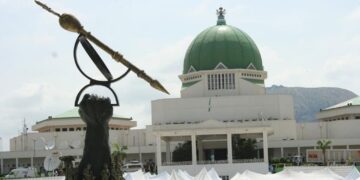[ad_1]
The Chief Executive Officer, Centre for the Promotion of Private Enterprise (CPPE), Dr Muda Yusuf, has called on the Federal Government to consider tweaking tariff policies by granting concessionary import duty on intermediate products for industrialists as a way of reducing the pressure of inflation on individuals and producers.
Dr Yusuf made this call in his comments on the October inflation on Wednesday, November 16, 2022.
It would be recalled that the National Bureau of Statistics (NBS) had on Tuesday released the Consumer Price Index (CPI) report which showed that headline inflation in Nigeria rose to 21.09 per cent in October from 20.77 per cent recorded in September.
The NBS also said that food inflation rose to 23.72 per cent in October from 23.34 per cent in September 2022.
In his comments, Dr Yusuf said urgent government intervention was required to address the challenges in the supply side of the economy.
He said, “Tackling inflation requires urgent government intervention to address the challenges bedeviling the supply side of the economy, addressing production and productivity constraints, fixing the dysfunctional forex policy, and institution of fiscal reforms to curb escalating deficit spending.
“To give producers and citizens some relief, the government could tweak the tariff policies by granting concessionary import duty on intermediate products for industrialists, especially those in the food processing segments of the agriculture value chain.”
ALSO READ FROM NIGERIAN TRIBUNE
The CPPE CEO noted that accelerated growth in fiscal deficit financing by the Central Bank of Nigeria (CBN) was heightening liquidity in the economy with consequences for soaring inflation.
“Mounting inflationary pressures have the following consequences for the economy: weakening of purchasing power of citizens as real incomes are eroded; increasing poverty incidence; escalation of production costs which negatively impacts profitability; erosion of shareholder value in many busineses; weakening of investors’ confidence and declines in manufacturing capacity utilisation,” he said.
Dr Yusuf said though the factors fuelling inflation are global, others are domestic and a combination of structural and policy issues.
“These factors include the depreciating exchange rate, rising transportation costs, logistics challenges, forex market illiquidity, hike in diesel cost, climate change, insecurity in many farming communities and structural bottlenecks to production.
“These are largely supply side and policy concerns. Monetary policy tightening in most economies around the world, especially the leading economies, is also driving imported inflation and the depreciation in the exchange rate,” he added.
[ad_2]







